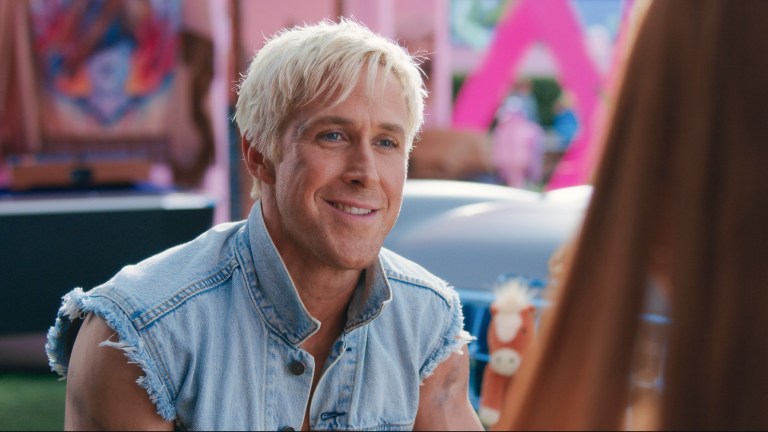Barbie: Ken’s Big Character Reveal Is a Disturbing Twist
Ryan Gosling’s Ken is a terrific comedic creation, but plot twists late in his character arc are actually quite chilling…

This article contains MAJOR Barbie spoilers….
When Ryan Gosling was announced for the role of Ken, Barbie’s eternally friend-zoned plastic boyfriend, there were two types of reactions. Those from folks who have seen the actor’s blistering comedy skills in The Nice Guys, and those who had not. For those who had, the idea of Gosling as a beach-blond himbo instantly seemed hilarious; the rest though were miffed that someone a little more Malibu-dreamy had not been selected for the part.
Now that Greta Gerwig‘s Barbie at last in theaters, however, there’s no more debate. Gosling is fabulous in the role. After all these years, he’s still rocking washboard abs and a flawless comedic timing, and he’s still able to make a doofus seem delightful. From Ken’s dawning realization that the patriarchy is a thing that exists in “the Real World” to his immediate attempts to buy into it by obliviously insisting that he’s qualified to be a doctor without a medical degree, a lawyer without a law degree, or even a “beach guy” (his term for lifeguard) without knowing how to swim, Gosling’s swaggering unearned confidence is cackle-worthy.
At least until it’s not. Because while Gosling won over doubters with an irrepressibly boyish smile and (again) all those goddamn abs, he’s never actually dreamy. In fact, the further we get into what Gerwig and her producer/star Margot Robbie are really up to in Barbie, the clearer it becomes that Ken is, as he insists in his power ballad, more than a friend. We’d even go so far as to say this Malibu hunk is the villain of the piece.
This shock becomes apparent during the biggest twist of the movie. After Robbie’s ebullient Barbie meets the real human women who need her help, Gloria (America Ferrera) and Sasha (Ariana Greenblatt), she and Gerwig’s film pleasantly throw off the “fish out of water” comedy we’ve seen in so many similar movies about fictional characters coming into the real world. Instead, Barbie invites Gloria and her daughter into her utopian paradise for women, Barbieland. There’s just one problem though; Gosling’s goofy Ken has rushed back before them to tell all the other Kens about this thing he discovered in the real world. He tells them about patriarchy.
Thus when Robbie’s Barbie and the humans get back, instead of a utopia they find a dystopia–the kind only attractive to Fox News pundits and subscribers to Maxim. In little more than a day, Gosling’s Ken has introduced the patriarchy to Barbie’s world. Within that time, all the other Barbies have been brainwashed faster than you can say “Stepford,” now happy to serve their Kens beers and wait to be acknowledged by the dudes. Even the Barbie Dream Houses have been co-opted into Ken Mojo Dojo Casa Houses, with Gosling’s Ken taking a special pleasure in transforming Robbie’s Barbie home into a swinging bachelor’s pad.
It’s a shocking turn of events, but it also gets to the heart of what makes Gerwig’s film so interesting beyond all its toyetic trappings.
The director and co-writer of the film is very much leaning into the gender norms and dynamics that have long defined the ostensibly “girlie” Barbie dolls. If at the beginning of the movie, Barbieland is a pink paradise based on what Mattel assumes young girls want in a toy or fantasy lifestyle, the Barbieland of the film’s midpoint is now a dude dump where the Barbies dress as maids and eagerly look forward to having Ken explain the importance of The Godfather to them or play acoustic covers of angsty alt-rock ‘90s ballads about needing to “push you around.” As Robbie’s Barbie ironically begs Ken, “Can you please sing the song to me while maintaining awkward eye contact for the entire four and a half minutes?”
However, this film is more than just a throwback to ‘60s “battle of the sexes” comedies, or the dippy gender clichés enshrined by all the television sitcoms of the ‘90s that played in the background of Gerwig, Robbie, and co-screenwriter Noah Baumbach’s childhood homes. In fact, the movie is getting at something quite a bit more sophisticated than “men are from Mars and women are from Venus,” and certainly more than the bad faith “anti-man” reading of the film already being mewled over by right wing pundits.
Rather by the film’s very design, Robbie’s Barbieland is not a paradise because only women rule it, a la Wonder Woman’s Themyscira and the similar feminist constructs of the early 20th century which inspired it. It’s a utopia because unlike Wonder Woman’s Paradise Island, none of the inhabitants know about misogynistic slights or sexist concepts, including Ken’s soon-idealized patriarchy. Both Barbie and Ken live in blissful ignorance.
In fact, as Barbie points out more than once, the Kens of Barbieland are essentially a reversal of the roles women endure in the real world. This is underlined as soon as Robbie and Gosling’s characters arrive in the real world on Venice Beach. Hearing the sound of construction work, Barbie instantly assumes that only women will be working with power tools. Later Gosling’s Ken verbalizes that unlike in Barbieland, the men run the world here. He is intoxicated by looking at dollar bills covered with the faces of only men, and he’s flabbergasted that in this reality, a guy could be a doctor (even if they need pesky things like “degrees”).
So if you were to look at it in a very narrow way, Ken’s desire to prove his self-worth and competency is not that different from women in the real world wanting to emancipate themselves from the impossible expectations and cultural double standards placed on them at near birth by a world run by men. He even sings “Is it my destiny to live and die a life of blonde fragility?” In the case of Barbieland, the artifice of gender norms and constructs are flipped upside down. Barbie runs the world and Ken is “just Ken.”
If you broaden the way you look at it, however, Ken is more than just an unusual lens for looking at the pressures society puts on women; he’s also a lens that examines the pressures society puts on men. As Ken later admits to Barbie at the end of all things, he didn’t even really care what “patriarchy” was after he discovered it didn’t involve horses. In his own dimly innocent way, he is caving to the expectations placed on him as a man—see also the lyric “I am Ken and I’m enough, and I’m great at doing stuff”—and those expectations include him being an alpha winner who gets the girl. So he postures as a douchebag who indulges all the trappings of toxic masculinity because he thinks that’s what he needs to do to be cool enough to get the girl. To be enough.
Gerwig is using farce, satire, magical realism, and finally an IP associated with unattainable standards that are placed on women in childhood, as we all as boys, to illustrate the absurdity of a patriarchal system and any other that would make assumptions based on gender or sex. And yet… Ken is still essentially the movie’s villain.
It isn’t because he’s a man; it’s because after seeing how prevalent and successful the patriarchal system still is in 2023 America, Ken runs back to Barbieland and duplicates it. Now the Barbies are forced to be “just Kens,” and just as many women in the real world are encouraged to be nothing more than decorative objects. While Ken introduces the most naked and humorously cartoonish elements of toxic masculinity to his home, it is still insidious. He even takes the house of the Barbie he is smitten with and tells her she can only stay if she agrees to get him a beer.
It’s a genuinely shocking development for a movie that’s marketed as breezy beach fun time. Gosling is still able to imbue it with a high degree of comedic star power too. He gets a deliriously grandiose anthem of self-pity in a sequence that evokes “Grease Lightning” and the dream ballets that would appear in old classic MGM musicals like Singin’ in the Rain. It makes it a lot more fun to digest, and it even has enough space to empathize with Ken’s chaffed anguish from being placed in a box all his life. But do you think it’s hard for Gerwig to relate to that?
Yet he is not some misunderstood child; Ken is the dude who implemented and tried to take advantage of a system where he could be on top and his dream girl would be subservient to his whims. So while Barbie can empathize with Ken and, fairly surprisingly, forgive him for his follies, it cannot reward him with the type of twee and phony Hollywood fantasy that Barbie dolls themselves are founded upon. This Ken does not get to kiss Barbie, and the romance of “Barbie and Ken” never will be.
But perhaps with a better understanding of each other as humans—or sentient dolls?—the Barbies and Kens of Barbieland can now at last make a better world. One where everyone can find a dream home of their own.
Barbie is in theaters now.

